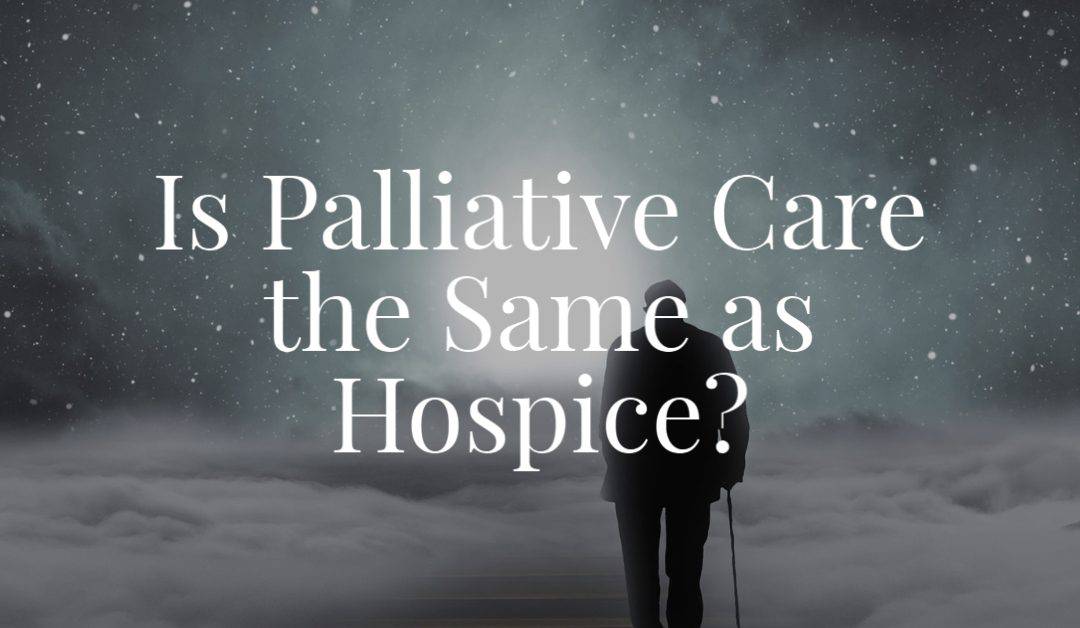Palliative care is specialized medical care for people living with an illness that affects their quality of life, such as cancer or heart failure. It includes care for an individual’s spiritual, emotional, and physical struggles. Anyone with a severe medical condition may choose palliative care, whether they are getting better or not. In this way, palliative care is not the same as hospice care. Let’s look at the differences between these helpful types of care.
What is Hospice Care?
Hospice care focuses on the quality of life for someone experiencing an advanced illness. The field of hospice care focuses on the specific needs of a patient during the last phases of an incurable disease. Hospice helps patients live as fully and comfortably as possible. It treats the person and symptoms of the disease instead of treating the disease itself.
According to The American Cancer Society, “Professionals work together to manage symptoms so that a person’s last days may be spent with dignity and quality, surrounded by their loved ones.”
Hospice care is a specific type of care that helps manage a dying person’s symptoms and life. The family is also involved in hospice care and may help make important decisions about what types of care are needed.
When there is no expectation that a person may recover, hospice care gives the dying person comfort and rest from pain. They may peacefully face the process of passing away with their loved ones close by.
Palliative Care vs. Hospice Care
When a patient has a severe medical issue, a relatively new field may treat their physical, emotional, and spiritual needs. Medical problems such as cancer, congestive heart failure, kidney failure, chronic obstructive pulmonary disease, AIDS, or Alzheimer’s often push a patient to seek palliative care.
Anyone with a severe medical condition may choose palliative care, whether they are getting better or not. In this way it is not the same as hospice care. Palliative care helps seriously ill individuals to live full lives despite their pain or disease. Hospice care also focuses on giving patients a full life. However, the difference is that Hospice care is for the dying.
Palliative care helps seriously ill patients experience a full life while they continue fighting to live their lives.
Patient Choices In Types of Medical Care
According to WebMD, palliative care considers the goals of the patient and family. The palliative care team develops care plans based on those goals.
Hospice care is also extensively based on what the patient and family choose for types of medical care.
For example, some patients may not approve the use of ventilators, dialysis, hydration, and nutrition therapies. Perhaps they also have a DNR order. These patients seem to want quality of life or no life at all.
However, others are focused on staying alive as long as possible by whatever medical means are available. These patients might work with their medical team to create a care plan that could include respirators, dialysis, surgeries, resuscitation, etc.
Many of us might fall somewhere in the middle. You might draw up a care plan with your medical team that includes some necessary medical procedures but rejects others.
The purpose of both palliative care and hospice care is to give you a quality of life and ability to live life to the fullest despite your health struggles.
Family Help
Palliative and hospice care often include counseling and care for the entire family. When severe illness strikes, a whole family is affected and drawn into the suffering. Often, family members don’t know how to act around the sick person. However, with counseling and religious clergy available to help as part of the care team, families can face complex issues together.
For example, let’s say a grown daughter has refused a blood transfusion because of limiting family beliefs. If her life depends on the transfusion, counseling that allows her to see the possibilities may help. She may choose to accept a transfusion and live rather than continue to accept defeat. Her whole family may even change their minds. Even if the family still disagrees with blood transfusions as a medical therapy, counseling may help them understand her choice.
We Can Help
At Renaissance, we care about the struggles you and your family face when someone suffers from a life-threatening illness. Understanding what you are going through is part of what we focus on to help you and your family plan for the future. Often, as you face illness, it clarifies the need to prepare for your family’s life after you are gone.
We work with you and your family to preplan so that your family doesn’t have to face the burden of planning a funeral and grieving at the same time. Making a funeral preplan takes the pressure off of your family and gives you a chance to make decisions about your final preparations. Contact us and find out all the ways we can help.


